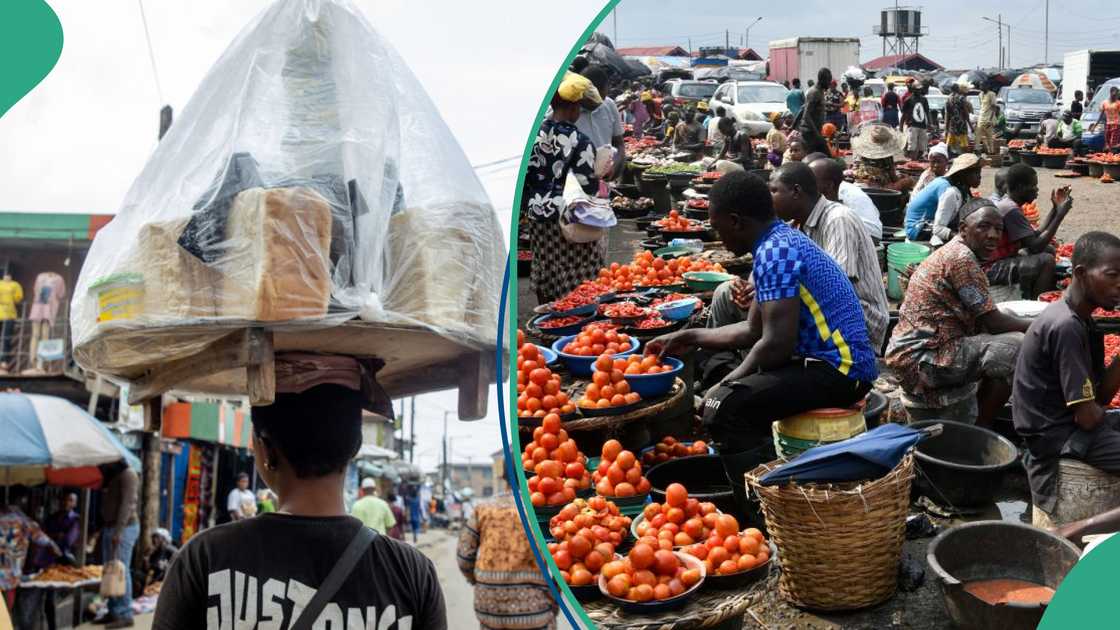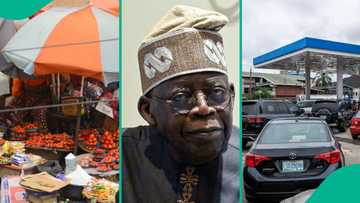10 Most Affordable States To Live in Nigeria As Fish, Meat, Other Items' Prices Drop
- A new report from the National Bureau of Statistics has announced a drop in Nigeria's inflation rate and food inflation rate
- According to the NBS report, the headline inflation rate declined by 0.3 percentage points, while the food inflation rate decreased by 0.08 percentage points
- The new inflation figures show that the rise in food prices has slowed compared to the previous month.
Legit.ng journalist Dave Ibemere has over a decade of business journalism experience with in-depth knowledge of the Nigerian economy, stocks, and general market trends.
The National Bureau of Statistics (NBS) has revealed that Nigeria's inflation rate declined in July 2024.
The bureau disclosed this in its latest Consumer Price Index (CPI) data, which showed a downward trend in the inflation rate for the first time in 19 months.

Source: Getty Images
Inflation is a decrease in the purchasing power of money, reflected in a general increase in the prices of goods and services in an economy.
PAY ATTENTION: Сheck out news that is picked exactly for YOU ➡️ find the “Recommended for you” block on the home page and enjoy!
It is used to gauge the cost of living and how stressed households have become due to economic factors.
Higher inflation means a lower value of money on hand, while low inflation means the purchasing power of money is preserved or increased.
Inflation data for July 2024
According to the NBS, Nigeria's inflation rate declined to 33.40% in July, down from the 34.19% reported in June 2024.
Food inflation, the major metric for determining the cost of living and overall economic well-being, also dropped to 39.53%, compared to 40.87% in June.

Read also
Petrol, cooking gas, electricity Tariff: List of 7 items whose prices have gone up under Tinubu
Although inflation figures remain high, there are signs of improvement ahead.
The NBS, in its report, explained why food inflation dropped:
"The fall can be attributed to the slower rate of increase in the average prices of various items, including tin milk and baby powdered milk (under the milk, cheese & egg category), mudfish, fresh fish (Obokun), and snail (under the fish category), date palm fruit (Debenu) and watermelon (under the fruits category), garri and akpu (fufu) (under the bread and cereals category), exercise books and textbooks (under the books & stationery category), and turkey meat and minced pork (under the meat category)."
Most affordable states
Based on the inflation rate figures, here are the top 10 affordable states to live in right now in Nigeria.
Benue
Benue remains one of the most affordable states to live in Nigeria, maintaining relatively low living costs, with its food inflation rate at 36.4% and all-item inflation rate at 27.3%.
Both are lower than the national average.
Delta
Delta occupies the second position as the most affordable state. It has a food inflation rate of 37.6% and an all-item inflation rate of 28.1% in July 2024.
Borno
Borno is also among the states with lower living costs. In July 2024, its food inflation rate was 40.3%, and its all-item inflation rate was 28.3%, reflecting consistent affordability in its cost of living.
Katsina
Katsina remains one of the more affordable options for residents in Nigeria, with a food inflation rate of 38.3% and an all-item inflation rate of 28.6%.
The state's living costs remain relatively low compared to many other states.
Taraba
Taraba's food inflation rate is 39%, and its all-item inflation rate is 29.1 %. Life for residents based on the inflation rate is better than others.
Adamawa
Adamawa maintains its position as one of the states with the lowest cost of living in Nigeria. Its food inflation rate is 33.5 %, which is the lowest among all states.

Read also
"Why is naira struggling?": CBN records highest amount of dollars to enter Nigeria in one month
While its all-item inflation rate is 29.3%, showing stability in its declined compared to previous months.
Imo
Imo's food inflation rate is 40.9%, with an all-item inflation rate of 30%. Although slightly higher, it still ranks among the more affordable states.
Nassarawa
Nassarawa has a food inflation rate of 36.6% and an all-item inflation rate of 31.6%. The state's cost of living remains relatively moderate compared to others.
Ogun
Ogun's food inflation rate is 37.5%, while its all-item inflation rate stands at 31.6%. The state continues to be a cost-effective choice for residents.
Enugu
Despite having a high food inflation rate of 44.1 %, Enugu still maintains a position among the more affordable states in Nigeria, as its all-item inflation rate stands at 32.2% lower than the national average.
Ten most expensive states to live
Legit.ng earlier reported that a new report by the Nigerian Bureau of Statistics (NBS) identified the ten most expensive states to reside in Nigeria based on inflation.
In its consumer price index report, the NBS said the headline inflation rate, which measures the country's price changes of goods and services, rose to 33.69%.
April 2024 inflation rate is 11.47% points higher compared to the rate recorded in April 2023, which was 22.22%.
PAY ATTENTION: Unlock the best of Legit.ng on Pinterest! Subscribe now and get your daily inspiration!
Source: Legit.ng





